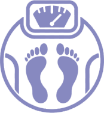Unlocking the Power of Intermittent Fasting: A Beginner’s Guide to Starting Strong
Intermittent fasting has gained popularity in recent years as a powerful tool for weight loss, improved health, and increased longevity. This eating pattern involves cycling between periods of eating and fasting, and has been shown to have numerous benefits for both body and mind. In this beginner’s guide, we will explore the basics of intermittent fasting, how to get started, common questions and concerns, and tips for success.
What is Intermittent Fasting?
Intermittent fasting is not a diet, but rather an eating pattern that involves cycling between periods of eating and fasting. There are several different methods of intermittent fasting, but the most common include:
- 16/8 method: This involves fasting for 16 hours each day and eating all your meals within an 8-hour window.
- 5:2 method: This involves eating normally for 5 days of the week and restricting calories to 500-600 on the other 2 days.
- Alternate day fasting: This involves alternating between days of normal eating and days of fasting or severely restricting calories.
Benefits of Intermittent Fasting
Intermittent fasting has been shown to have numerous benefits for both body and mind. Some of the key benefits include:
- Weight loss: Intermittent fasting can help promote weight loss by reducing calorie intake and increasing fat burning.
- Improved metabolic health: Intermittent fasting has been shown to improve insulin sensitivity, reduce inflammation, and lower the risk of chronic diseases such as diabetes and heart disease.
- Increased longevity: Studies have shown that intermittent fasting can increase lifespan and delay the onset of age-related diseases.
- Improved brain health: Intermittent fasting has been shown to improve cognitive function, increase focus and concentration, and reduce the risk of neurodegenerative diseases such as Alzheimer’s.
Getting Started with Intermittent Fasting
If you are new to intermittent fasting, it is important to start slow and gradually build up your fasting periods. Here are some tips to help you get started:
- Choose a fasting method that works for you: There are several different methods of intermittent fasting, so choose one that fits your lifestyle and preferences.
- Start with a shorter fasting period: If you are new to fasting, start with a 12-hour fasting period and gradually increase it as you become more comfortable.
- Stay hydrated: Drink plenty of water during your fasting periods to stay hydrated and help curb hunger.
- Listen to your body: Pay attention to how you feel during your fasting periods and adjust as needed. If you feel lightheaded or weak, it may be a sign that you need to eat.
- Be patient: It may take some time for your body to adjust to intermittent fasting, so be patient and give yourself grace as you navigate this new eating pattern.
Common Questions and Concerns
As with any new eating pattern, there are common questions and concerns that may arise when starting intermittent fasting. Here are some of the most frequently asked questions:
Will I be hungry all the time?
While it is normal to feel hungry during your fasting periods, this feeling typically subsides after the first few days as your body adjusts to the new eating pattern. Drinking water, tea, or coffee can help curb hunger during fasting periods.
Can I still exercise while fasting?
Yes, you can still exercise while fasting. In fact, many people find that exercising during fasting periods can enhance fat burning and improve overall fitness. However, it is important to listen to your body and adjust your workouts as needed.
Will intermittent fasting slow down my metabolism?
Contrary to popular belief, intermittent fasting has been shown to have positive effects on metabolism by improving insulin sensitivity and increasing fat burning. However, it is important to ensure that you are still eating enough calories and nutrients during your eating periods to support your metabolism.
Tips for Success
To make the most of your intermittent fasting journey, here are some tips for success:
- Plan your meals: Plan ahead and have healthy, balanced meals ready to eat during your eating periods to avoid making unhealthy choices out of hunger.
- Stay consistent: Consistency is key when it comes to intermittent fasting, so try to stick to your fasting and eating schedule as much as possible.
- Listen to your body: Pay attention to how you feel during your fasting periods and adjust as needed. If you are feeling overly hungry or fatigued, it may be a sign that you need to eat.
- Be patient: Results may not happen overnight, so be patient and give yourself grace as you navigate this new eating pattern.
Conclusion
Intermittent fasting is a powerful tool for weight loss, improved health, and increased longevity. By following the tips and guidelines outlined in this beginner’s guide, you can unlock the power of intermittent fasting and start strong on your journey to better health and wellness. Remember to listen to your body, stay consistent, and be patient as you navigate this new eating pattern. With time and dedication, you can reap the many benefits that intermittent fasting has to offer.
Are you ready to unlock the power of intermittent fasting and transform your health? Start strong today and embark on a journey to a healthier, happier you!












































